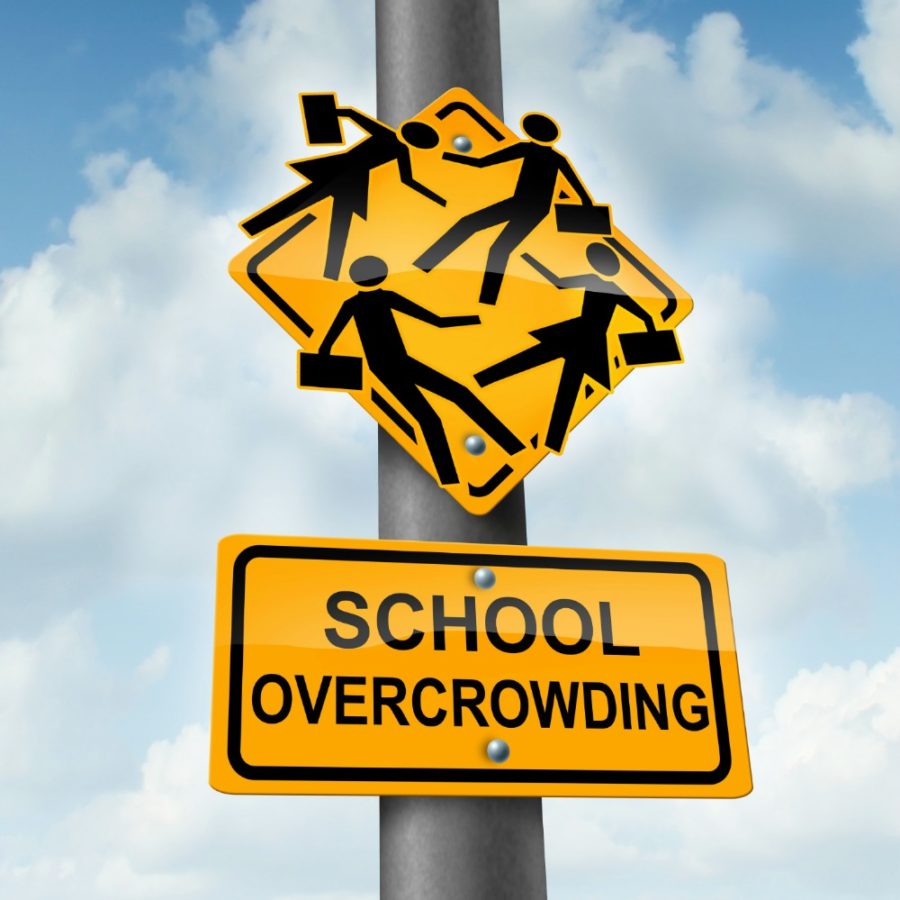Crowded Classrooms and Packed Parking Lots
School overcrowding and classroom overcrowding concept as a crossing traffic sign with overcrowded students bursting out of the seams as a symbol of the problems of public education financing and lack of teachers.
September 8, 2018
Quartz Hill High School previously had an ongoing struggle with the number of students enrolling in the school and the high demand for certain classes. With just over 3,000 scholars enrolled for the 2018-2019 school year and only 119 teachers* available, QHHS has one of the highest students to teacher ratios in the AVUHSD and is struggling to meet the needs of its students. The school is at such a high capacity that the parking lot located at the front of the school had to be expanded in order to accommodate the traffic needs of so many students and parents. This is simply one measure that has been taken in order to try to provide a more efficient, stable environment for students that fulfills the school’s mission statement.
There have been reasonable concerns with the number of students entering the school each year. Whether it be nonchalant complaints of the school being “too crowded,” the grumbles of the inconveniences of navigating through a slow sea of high school students, or the consistent traffic problems that led to the expansion of the parking lot, it all interconnects with the number of students enrolled at the school.
Despite the large number of students at QHHS, there are still inconsistencies within the fundamental balance of the school: the classes. Certain courses are packed, while others are undercrowded. For example, Calculus AB (AP) and Environmental Science AP are in high demand, with periods exceeding 32 students. On the other hand, AP Chemistry was left undesired and is currently not offered on campus.
With many students being crammed into specific periods, it is natural to question whether an overcrowded classroom has an effect on the learning environment of that particular class.
QHHS sophomore Mojubaoluwa Dapo Thomas offered: “No it does not affect my learning. I actually feel that it helps me. When there are more people you get to hear the different perspectives that students have.”
Additionally, QHHS Junior, Lauren Reid, offered a more direct approach to the question, saying, “My math class has fewer people in it and I still failed the math quiz, so I don’t think it makes a difference.”
On the other side of the argument, QHHS sophomore Michael Telezing interposes, “…my Environmental Science class is pretty big… it makes me feel claustrophobic and it’s hard to be in a workplace where someone’s elbow is hitting your elbow while you’re taking a test.”
While some students may not care so much about crowded classrooms, there are some who are affected and may find their situation far from ideal. This “no child left behind” attitude of ensuring that all kids get the opportunity of being in a class is not as beneficial as it may seem, and it affects not only the students, but the teachers as well.
With so many kids in one classroom and only one teacher, it makes it difficult to accommodate each and every one of their needs while simultaneously addressing the class as a whole. Teachers may lose personal connections with students as teaching, and learning is often quite personalized and essentially takes place with two individuals: the teacher and the student. This relationship becomes much more difficult to maintain when the teacher has an extensive amount of students to worry about, and it becomes something much more artificial as teachers become more and more overwhelmed. This greatly damages the students’ learning experience.
While overcrowding will likely continue to be an issue at QHHS, it is simply up to the school to “produce responsible citizens who are able to communicate effectively, to set and achieve realistic goals, and who become lifelong learners” despite the given circumstance.
*The Staff Directory on www.qhhs.org is not up-to-date.



